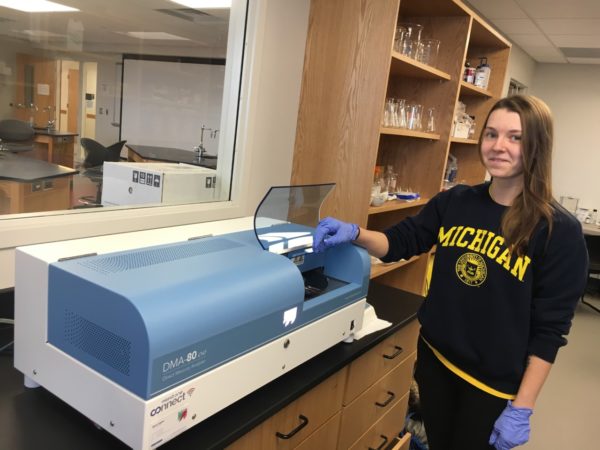
- Details
- By Native News Online Staff
BRIMLEY, Mich. — Students at Bay Mills Community College (BMCC), a tribal college operated by the Bay Mills Indian Community, will get hands-on experience with a high-tech mercury analyzer in the classroom thanks to a grant from the U.S. Dept. of Agriculture.
The Direct Mercury Analyzer (DMA-80) will allow students to collect their own samples to check for mercury concentration, process them, and evaluate the data. BMCC is working with Bay Mills Biological Services, which allows students to evaluate the mercury levels of fish from the local area. In the past, sample material had to be sent to British Columbia for mercury testing.
“The DMA is being used for student capstone projects, investigating mercury levels in Lake Superior walleye, as well as in supermarket fish. Part of this work is tied into ongoing BMCC research through a National Institute of Food and Agriculture funded project,” said Dr. Diana McKenzie, BMCC science department chair.
Students began using the new equipment in early January and have been enthusiastic about the results.
“From sample collection to troubleshooting, this really gives students ownership of their work,” said McKenzie. “And the quality of the data is coming out really good.”
McKenzie hopes the excitement surrounding the new creates enthusiasm among BMCC students to enter the STEM field. The new equipment rivals that of major universities and will not only enhance the lab experience for students, but also will improve tribal capacity and research opportunities.
More Stories Like This
Native Americans Could Be Hit Hard as Education Department Resumes Student Loan Wage GarnishmentHanging a Red Dress for Christmas: MMIP, Native Higher Education, and Hope for a Better New Year
Native Students Can Win $5,000 Scholarship, International Distribution in Pendleton Design Contest
American Indian College Fund Raises Alarm Over Plan to Shift Native Programs Away From the Dept. of Education
MacKenzie Scott Foundation Gives $5 Million Contribution to Little Priest Tribal College
Help us defend tribal sovereignty.
At Native News Online, our mission is rooted in telling the stories that strengthen sovereignty and uplift Indigenous voices — not just at year’s end, but every single day.
Because of your generosity last year, we were able to keep our reporters on the ground in tribal communities, at national gatherings and in the halls of Congress — covering the issues that matter most to Indian Country: sovereignty, culture, education, health and economic opportunity.
That support sustained us through a tough year in 2025. Now, as we look to the year ahead, we need your help right now to ensure warrior journalism remains strong — reporting that defends tribal sovereignty, amplifies Native truth, and holds power accountable.
 The stakes couldn't be higher. Your support keeps Native voices heard, Native stories told and Native sovereignty defended.
The stakes couldn't be higher. Your support keeps Native voices heard, Native stories told and Native sovereignty defended.
Stand with Warrior Journalism today.
Levi Rickert (Potawatomi), Editor & Publisher

